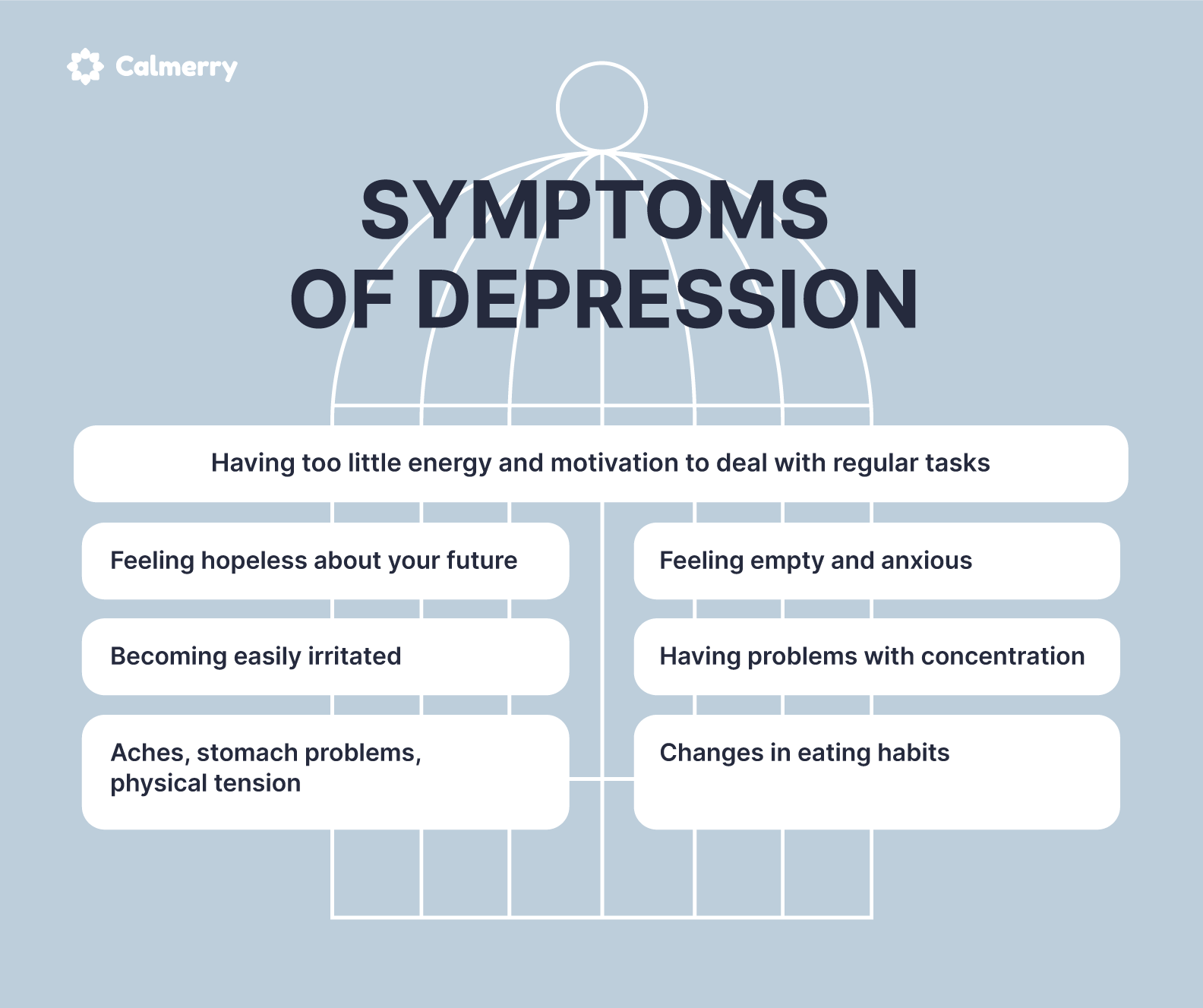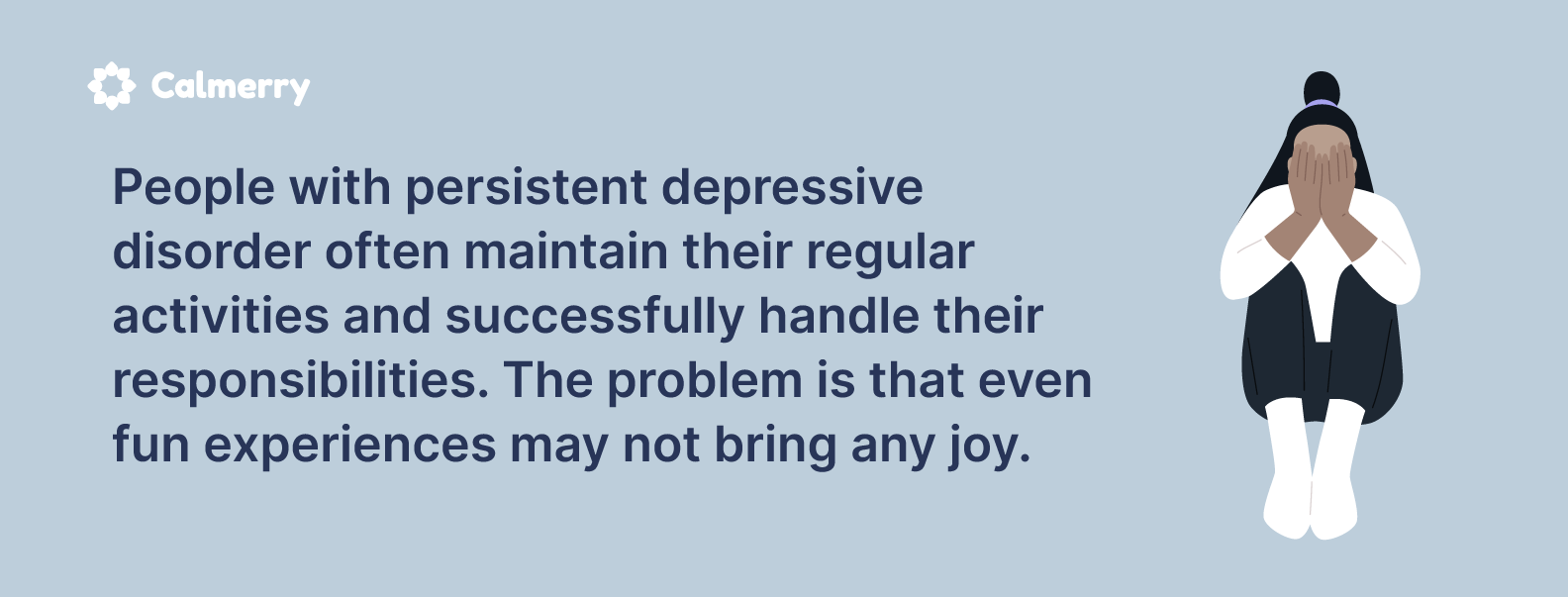Why Do I Feel Sad for No Reason, and What Should I Do?

Our mood may change depending on countless factors. Emotions are a response to our environment, thoughts, and experiences, so they cannot be static — there will always be ups and downs.
Even though all of us would like to always be happy and joyful, it’s virtually impossible for a human being to stay positive constantly.
Sadness is one of the basic emotions that we all feel from time to time. Most often, we feel sad when we are disappointed, hurt, or frustrated.
Everyone has many reasons to be sad, and when we’re feeling low, we usually know exactly what ruined our mood.
However, sometimes, people feel like their sadness came out of nowhere.
What to do when you feel sad for no reason? The main thing is to keep in mind that a feeling of relief usually follows sadness. Just like any other emotion, sadness won’t last forever, so don’t be afraid to acknowledge and validate your emotions.
Even though sadness is a negative emotion, it’s healthy, and sometimes it may be helpful.

Sometimes, sadness can help you reevaluate relationships with others and reconsider priorities.
If you’re sad, that doesn’t mean that you’re not coping with a problem — it may simply mean that you need some time to process the situation and adapt to it.
A therapist can provide valuable guidance and support during these challenging times, assisting you in navigating the complex terrain of your emotions and facilitating personal growth.
In this article, we will consider sadness in more detail, explore the connection between sadness and mental health, and think of what can cause negative thoughts and feelings.
Understanding sadness
Everyone experiences sadness differently. For example, sadness can be accompanied by general unhappiness, anger, guilt, anxiety, or distress. The way you feel when you’re sad directly depends on the situation that triggered this emotion, as well as your perspective and interpretation.
Sometimes, these other feelings can be much stronger, so you may not even realize that you’re sad. Besides, sadness can manifest itself not only emotionally but also physically.
For instance, you may have headaches or sleep problems.
Sadness may also affect people’s behavior. When we feel sad, we may avoid social interactions or act defensively around others.
Sadness can also lead to a loss of motivation, affecting a person’s productivity and professional performance.
Why do we feel sad?
There are millions of possible situations that can make someone feel sad.
Here are just a few common reasons for sadness, some of which may look familiar to you:
- A breakup
- A divorce
- Loneliness
- Problems at work
- Chronic, overwhelming stress
- Problems with health
- Major life changes
- A loss of a loved one
- Hormonal changes caused by puberty, menopause, drugs, or medications
- Lack of quality sleep
- Seasonal sadness
- Unhelpful thinking patterns, including self-criticism or focusing on the worst-case scenarios
Any of the examples above can create a lot of room for negative thoughts, and these thoughts can, in turn, make you feel worse.
Therefore, it’s important to keep in mind that sadness itself isn’t bad.
There’s nothing wrong with you; you just have to acknowledge this feeling and take some time to cope with it.
But why am I sad for no reason?
If you’re feeling down and cannot figure out why, it may feel weird. However, you should keep in mind that it’s completely normal to feel sad without knowing the reason.
Some people may note that their mood declines when it rains outside, while others may feel sad because of negative memories that they try to ignore.
Understanding the reason behind your feelings allows you to take specific steps to improve your mood and overall well-being.
If you’re feeling low for no apparent reason, you can figure out what made you upset by talking to a therapist. Sometimes, we just need to dedicate more time to self-reflection and pay more attention to details.Therapy allows you to spot unhelpful thoughts that trigger negative feelings so that you can challenge them and regain control over your emotions.
Depression vs. sadness
Depression is one of the most common mental health problems, with 3.8% of the world population affected by it [1] World Health Organization: WHO & World Health Organization: WHO. (2023, March 31). Depressive disorder (depression). https://www.who.int/news-room/fact-sheets/detail/depression . While sadness affects everyone — it’s an emotion, not a disorder.
So, if you feel sad, that doesn’t mean that you necessarily have depression. Nevertheless, you should never rule out such a possibility.
Sadness is one of the typical depression symptoms. As a symptom, it lasts longer than usual. People with major depressive disorder may feel down almost every day for at least 2 weeks.
It might also be accompanied by a number of other symptoms:
- Having too little energy and motivation to deal with regular tasks
- Feeling hopeless about your future
- Becoming easily irritated
- Aches, stomach problems, physical tension
- Feeling empty and anxious
- Having problems with concentration
- Changes in eating habits

For people with depression, sadness can become an almost constant feeling. Moreover, severe depression may intensify sadness, leading to a strong, persistent feeling of hopelessness and suicidal thoughts.
If you have suicidal thoughts or consider self-harm, please immediately contact the National Suicide Prevention Lifeline
Are people with depression always sad?
There is a common opinion that people with depression are always sad and never look happy. The truth is that it’s no more than a misconception.
The Diagnostic and Statistical Manual of Mental Disorders (DSM-5) describes several types of depression. Most often, people experience episodes of depression that may last for a few weeks or longer.
Once an episode is over, a person may not feel sad or have any other symptoms.
However, persistent depressive disorder, also known as dysthymia, is different. It doesn’t let you take a break in between episodes. In this case, symptoms of depression may last for years.
The symptoms, however, may not have the same disruptive impact on one’s life as when dealing with major depressive disorder.

People with dysthymia may hold a generally negative attitude. Besides, this disorder may lead to low self-esteem and a lack of motivation.
If you keep asking yourself, “Why do I feel sad for no reason?” and your sadness doesn’t seem to ease with time, the best solution is to take a depression test and discuss the results with a licensed therapist.
A therapist can also suggest some coping strategies that might help you if you’re feeling sad for no reason.
Other possible reasons for being sad
Depression isn’t the only mental health issue that can make you feel sad.
Here are some other common reasons why people experience sadness without any obvious reasons.
Bipolar disorder
Sadness can also be a result of bipolar disorder. In this case, sadness caused by depressive episodes is followed by episodes of mania when a person experiences an intense feeling of happiness or even euphoria.
Changes in mood usually happen quickly, with both depressive and manic episodes lasting for a week or longer.
Seasonal affective disorder
Some people may also feel sad in winter and autumn. If the weather triggers a strong and persistent feeling of sadness, it can be a sign of seasonal affective disorder (SAD).
In this case, sadness isn’t necessarily related to depression or any other mental health problems. For instance, sometimes, it is rooted in physical health.
Hormonal changes
Sadness is a common symptom of premenstrual syndrome. About 48% of women in their reproductive age experience its symptoms which may vary in severity [2] Gudipally, P. R., & Sharma, G. K. (2023, July 17). Premenstrual syndrome. StatPearls – NCBI Bookshelf. https://www.ncbi.nlm.nih.gov/books/NBK560698/ . The reason why the menstrual cycle may affect your mood is that your hormonal balance changes.
For the same reason, many women develop symptoms of depression before menopause.
Drugs and medications
Sadness can also be related to drug use. It’s a common symptom of withdrawal, but it’s not always caused by the use of illegal substances — it can also be a side effect when taking various kinds of medication.
For instance, many women who use hormonal birth control pills report having symptoms of depression, including sadness.
What to do when you feel sad for no reason?
It can be hard to understand and process why these feelings come up, especially since they may be related to past experiences or emotional events.
And there are some gentle steps you can take to cope with your feelings and move toward self-healing:
1. First, acknowledge your feelings
The first step to coping with feeling sad for no reason is to acknowledge your feelings, validate, and accept them without judgment.
Take a moment and check in with yourself – it’s important to understand that there’s nothing wrong with you for feeling this way.
Sadness is a natural emotion that everyone experiences at times.
Instead of judging yourself for feeling blue, try to figure out what kind of activities or routines might help lift your spirits. And explore what can help you increase your self-awareness, getting to the root of your emotions.
2. Do something you enjoy
Doing something you enjoy – whether it’s reading, playing games, investing time in a creative interest of yours, watching a movie, going for a walk, or listening to music – can boost your mood and take your mind off of whatever is causing you to feel sad.
Allow yourself to enjoy whatever activity you choose as an act of self-care to be able to work through the emotions you experience.
3. Talk to someone you trust
Talking to someone you trust – whether it’s a friend, family member, or therapist – can be a great way to start feeling better. When you talk about how you’re feeling, it can help to put things into perspective and make them seem less daunting.
Additionally, simply knowing that someone else is there for you can be a huge source of comfort.
4. Write down your thoughts and feelings
Writing down your thoughts and feelings can be a helpful way of dealing with them. Putting your thoughts into words through journaling can help you make sense of them and see them in a different light. Additionally, writing can be therapeutic and provide a much-needed outlet for your emotions.
5. Give yourself time
It’s important to give yourself time to heal. Just as it takes time for physical wounds to heal, emotional wounds need time as well.
Allow yourself the time and space necessary to work through your feelings in whatever way works best for you.
6. Minimize stress
Feeling stressed is inevitable, especially when you’ve gone through a terrible or traumatic ordeal. When you’re stressed, your body will start producing the hormone cortisol.
This hormone is beneficial in the short-term because it allows you to cope with the stress-triggering situation.
However, if you allow the stress to overwhelm you, you can easily fall into depression. To prevent stress from pushing you into a depressive state, find ways to minimize your stress.
7. Discover ways to bring laughter into your life
Sometimes, we tend to take life too seriously. One bad day can get you into a spiral of stress. However, even when things are tough, there is always a way out – laughter is one such way.
Laughter can help you stop feeling low by lifting your spirits and making you feel happier. When you laugh, your brain releases endorphins, improving your mood and reducing stress.
For example, watching a funny movie, reading a humorous book, or spending time with a friend who makes you laugh can brighten your day.s to heal, emotional wounds need time as well.
Allow yourself the time and space necessary to work through your feelings in whatever way works best for you.
Final thoughts

If you’re feeling low, you should keep in mind that this feeling won’t last forever. Sadness doesn’t necessarily mean that you’re depressed — you may just need some time to reflect on your feelings.
You can better understand what factors make you feel down by practicing self-awareness. And don’t forget about self-compassion — there’s nothing wrong with being upset.
It’s impossible for a human being to always feel happy and joyful. However, the reasons for sadness may not be obvious.
If you’re feeling sad for no reason, don’t hesitate to talk to a mental health professional on Calmerry. People feel sad for different reasons, and a licensed therapist can help you figure out what exactly could trigger changes in your mood.
They can also suggest effective self-care practices so that you can regain control over your emotions.
World Health Organization: WHO & World Health Organization: WHO. (2023, March 31). Depressive disorder (depression). https://www.who.int/news-room/fact-sheets/detail/depression
Gudipally, P. R., & Sharma, G. K. (2023, July 17). Premenstrual syndrome. StatPearls – NCBI Bookshelf. https://www.ncbi.nlm.nih.gov/books/NBK560698/
-
Learn morePersonalized online therapyChoose video, messaging, or both to fit your schedule and comfort. Get matched with your therapist within 1 hour.
-
Learn moreOne 60-minute live video sessionSee how online therapy works and get quick support with a single therapy session. No commitments.





